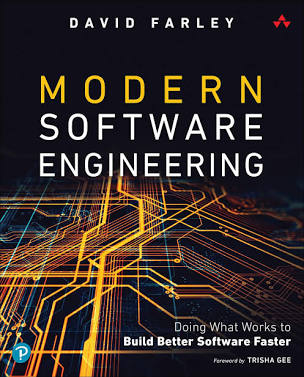
Modern Software Engineering - by Dave Farley
ISBN-13: 978-0137314911
Dave Farley's "Modern Software Engineering" challenges the status quo of software development practices. This book is a testament to continuous improvement and adaptability in the face of the fast-paced tech world. Farley's work is a wellspring of modern principles and practices, making it an essential read for those looking to refine their craft in software engineering.
MY NOTES
Continuous improvement is not just a buzzword but a necessity in the evolving landscape of software development.
Software engineering should be viewed as a precise and disciplined practice, much like any other form of engineering.
Adaptability and the willingness to change are hallmarks of modern software development.
The fusion of development and operations has brought forth a new era of speed and efficiency in software deployment.
Practices like Test-Driven Development (TDD) and Continuous Integration (CI) are not trends but essentials that underpin reliable software delivery.
A deep dive into the philosophies and practicalities that will shape the future of software engineering.
It's not just about the code, but also about the culture and practices that lead to successful projects.
Software engineering is a continuous process of learning and adaptation.
Efficiency in software development is achieved not through rushing, but through understanding and refinement.
"Feedback Loops" are the lifeblood of effective software engineering, providing the insight needed for improvement.
True agility in software engineering comes from a deep understanding of the principles, not just the practices.
Collaboration is more than just working together; it's about creating a shared understanding of problems and solutions.
Technical excellence is not an option; it's a necessity for sustainability and competitiveness.
Continuous Delivery is not just a technique, it's a philosophy that enables rapid, reliable, and repeatable delivery of value.
Testing is not a phase; it's an integral part of the development process, ensuring quality and reducing risks.
Practices like TDD (Test-Driven Development) are not just about testing; they're about design and specification.
The key to successful software engineering is not just technical skills, but the ability to solve problems collaboratively.
Refactoring is not about making changes; it's about improving the design of existing code without changing its behavior.
Automation in software engineering frees humans to focus on what they do best: solving complex problems.
The aim of software architecture should be to create systems that are easy to understand, develop, and maintain over time.
Investing in DevOps practices is not a cost; it's an investment in speed, stability, and scalability.
A culture of experimentation and learning is crucial for adapting to change and innovating in software engineering.
Software engineering should be viewed as a craft, with practitioners continuously honing their skills and knowledge.
The best software engineering practices are those that enable teams to deliver value consistently and with quality.
Understanding the domain is as important as understanding the technology; one cannot exist without the other in effective software engineering.
The ultimate goal of software engineering is to deliver value to users, not just to write code.